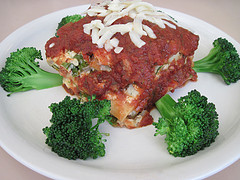
flic.kr/p/8rWmSK
The way people eat today is a far cry from the way people eat in the past. Previously, we’re usually happy with foods that are rich in fats and oils. We didn’t care about the amount of calories we eat in a day or how high the cholesterol in our blood is going to get if we consume this kind of food or that. Current trends in diet, however, have changed our general outlook about food. Instead of simply taking a liberal attitude about the kind of foods we eat, most of us have become more careful, to the point that some have even turned to vegetarianism and all its health and philosophical connotations.
The thing with vegetarians is that they do not get to consume those nutrients that are usually found only in animal products. Since they do not eat meat, vegetarians often restrict their diet to foods like: cheese and macaroni, vegetable soup, spaghetti, cheese pizza, eggplant parmesan, pancakes, oatmeal, grilled cheese, bean tacos and burritos, vegetable lo mein, French toast, French fries, vegetable pot pie, fruit shakes, bread, yogurt, cheese lasagna, peanut butter and jam, fruit salad, corn flakes, lentils, bulgur, and other non-meat products. One such important nutrient that vegetarians hold a danger of inadequate intake is lecithin.
What is Lecithin?
A phospholipid, sometimes referred to as phosphatidylcholine, lecithin is most often found in foods that are rich in fats and oils, such as whole eggs, organ meat, red meat, whole milk with cream, dairy cream, and liver. However, while these foods are high in lecithin, vegetarians and some health-conscious consumers often turn away from them. Not only are these foods rich in calories and fats, they are also animal products which vegetarians want to avoid.
Lecithin is an essential nutrient that our body needs. It is a primary component of our cell membranes and helps keep the liver to function normally, particularly in the metabolism of fat by bile, an enzyme secreted by the liver. A component of lecithin, choline, is also an important nutrient. “Essential” because our body can only get its supply of choline from the foods that we consume. There have been studies conducted wherein a deficiency in choline led to the occurrence of indications commonly associated with liver cirrhosis and cancer.
Alternative Sources of Lecithin
Considering how vital lecithin is, vegetarians, therefore, need to find their own alternative source of this valuable nutrient. The good news is that lecithin is fairly common and is found in most foods that we eat, whether it is plant or animal, in origin. One great source of lecithin is soy food, consumption of which has increased since its beneficial effects were discovered decades ago. Supplementation is also another alternative path that vegetarians can consume. A lot of drug companies are starting to market lecithin granules vegetarian to help vegetarian people get their adequate supply of this nutrient even without eating a lot of lecithin-rich foods.
A lot of experts say that out of all supplemental forms of lecithin, lecithin granules vegetarian is the best. Unlike other forms, lecithin granules vegetarian is versatile and can be consumed directly or be added as an ingredient to many food recipes.
Lecithin granules vegetarian are 97% pure phospholipids, which are essential to the structural integrity of the cell membrane. Lecithin granules vegetarian are often referred to as oil-free lecithin because all the natural oils have already been eliminated.
Tagged with: lecithin benefits • lecithin overview
Filed under: Lecithin